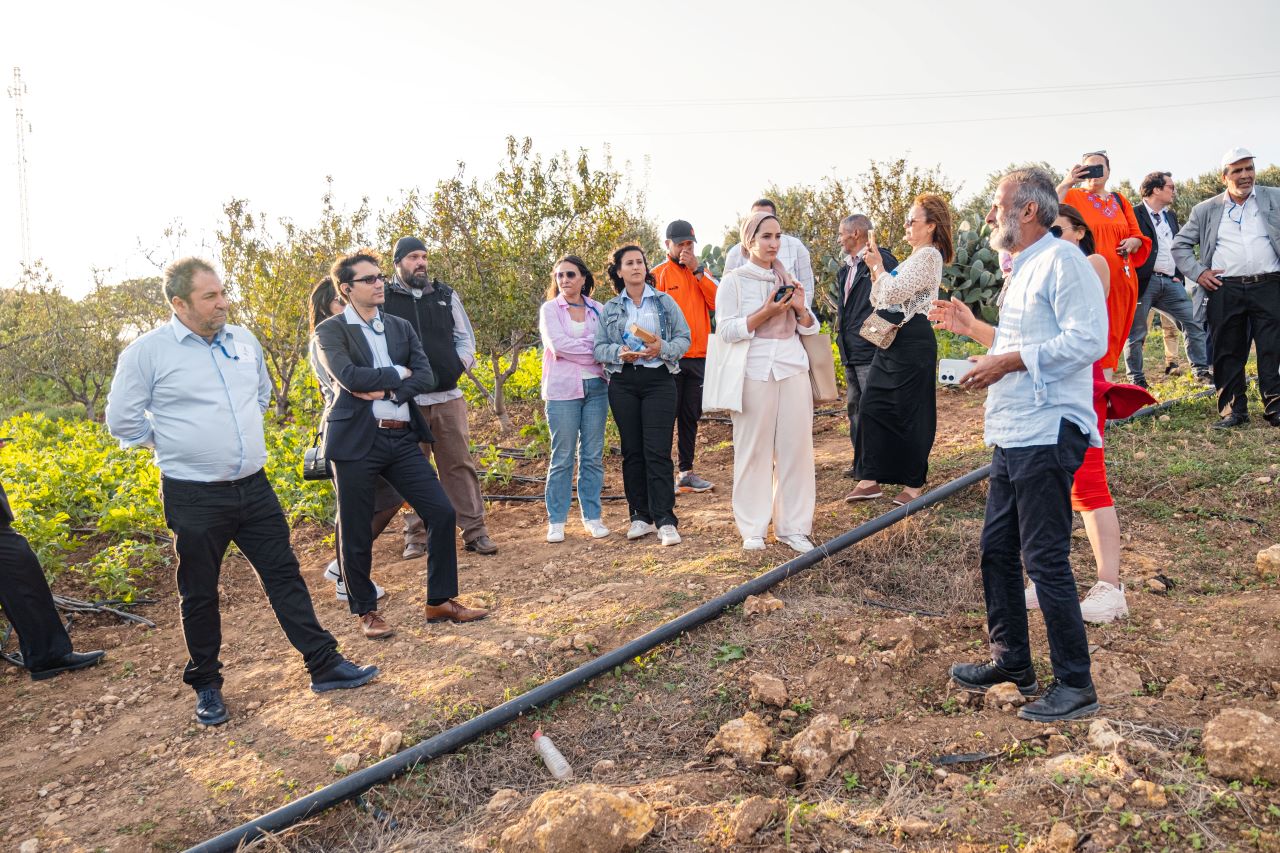Approximately 55 stakeholders from local, regional and national level, financial partners, institutional actors and representatives of the private sector of Tunisia attended the 1st Multistakeholder Meeting of the Project ACCISI-GEM “Adapting to Climate Change Impacts through Smart Irrigation in Ghar El Melh wetland area” that took place on November 7, 2024, in Bizerte, Tunisia.
The meeting highlighted several important issues, including the significance of ongoing collaboration as a crucial approach for addressing climate change impacts and advancing sustainability. It also underscored the role of technology in optimizing natural resource use and the critical need for investments in natural resources management. Testimonies from farmers using such technology showcased the benefits and tangible outcomes from the applications, and stressed the added value from working in synergy and in alignment with local needs.
Starting the opening segment, Dr. Anthi Brouma, Deputy Regional Coordinator, GWP-Med, stressed the value and novelty of the WEFE Nexus solutions and the need to accompany the demo technical applications with informed and inclusive policy dialogue on a financial mechanism that can support the replication and upscaling within and beyond Tunisia.
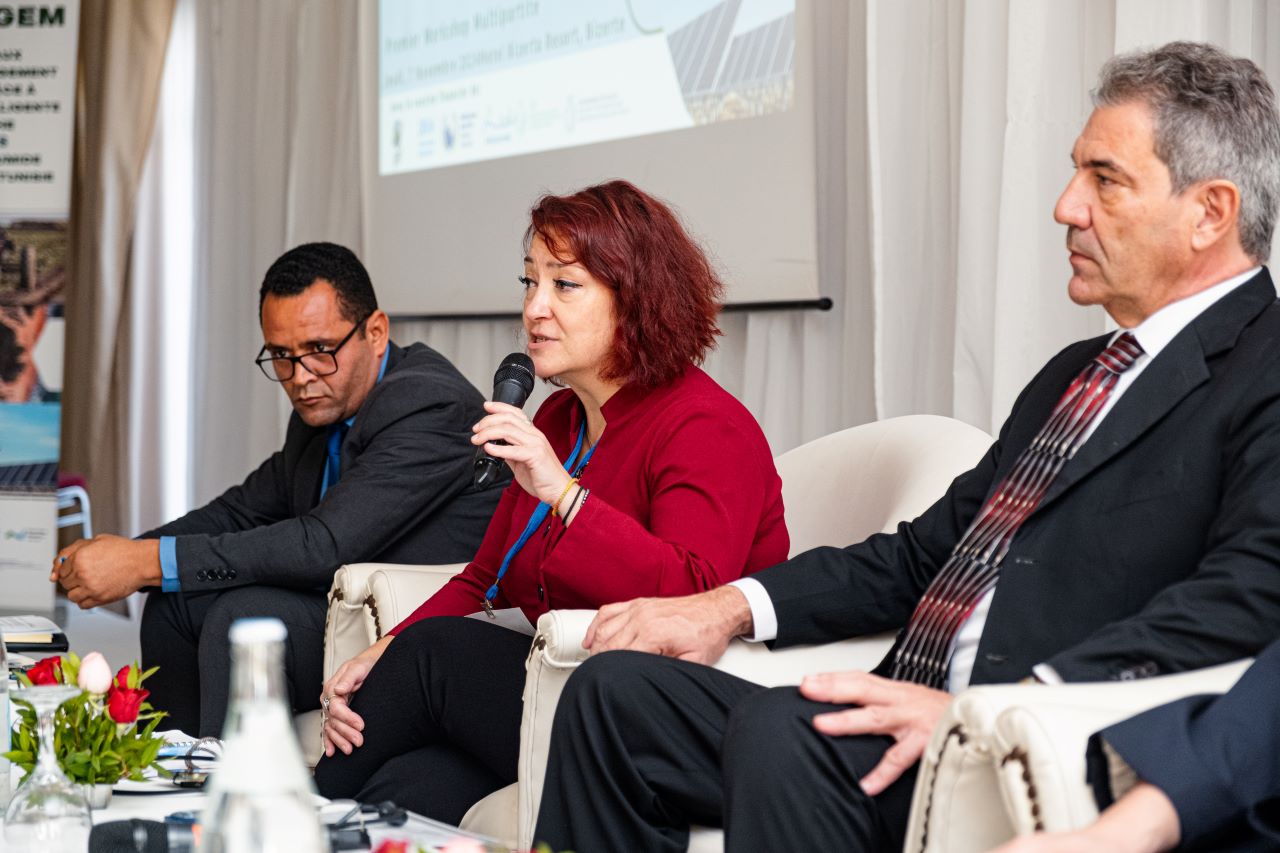
Dr. Brouma expressed gratitude for the trust that the Tunisian counterparts have shown to GWP-Med, already for more than 15 years of continuous work in the country, and emphasised the role of Tunisia as a frontrunner in the implementation of innovative approaches.
At his opening speech, Mr. Farid Dellai, Interim Commissioner at the Regional Commissary for Agricultural Development (CRDA) Bizerte, stressed the need for collaboration to sustain the agricultural sector of Tunisia, that is suffering from climate change impacts through the optimisation of the water resources for optimal use.
The role of GWP in strengthening the historic ties of Malta to Tunisia through interventions such as the ACCISI-GEM was highlighted by Mr. Manuel Sapiano, Chief Executive Officer, The Energy and Water Agency. For Mr. Sapiano, ASSICI GEM, although a small pilot project, is not a theoretical exercise, as it addresses a contemporary, real challenge by proposing practical technological solutions that adapt to customized needs.
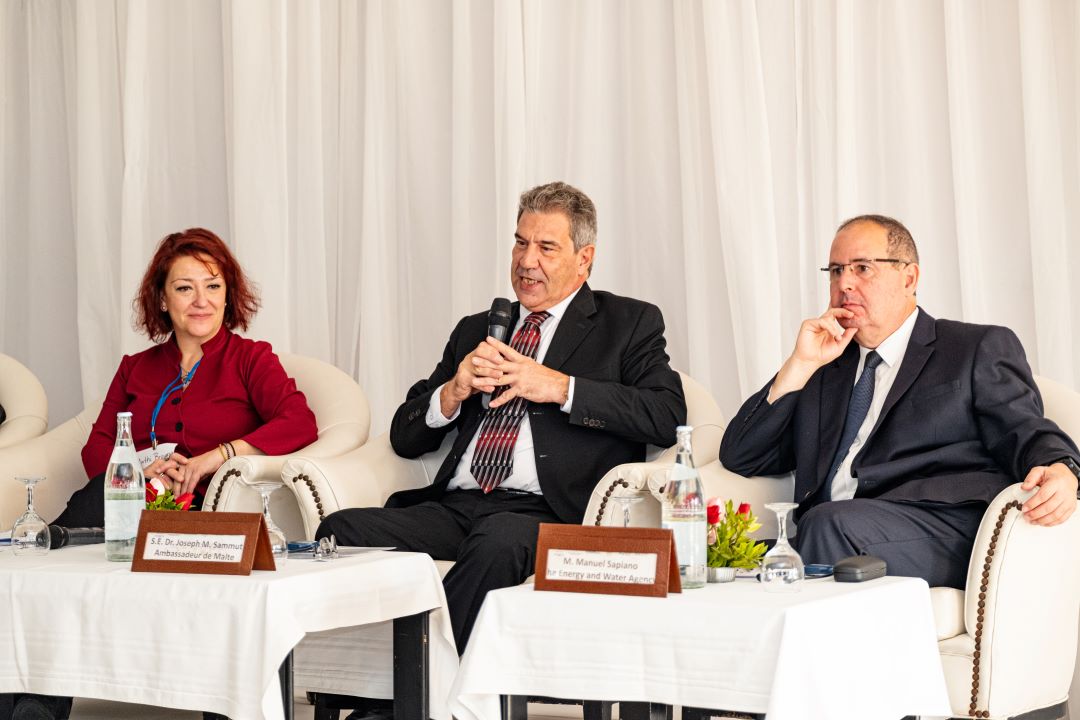
His Excellency, Dr. Joseph M. Sammut, Ambassador, Embassy of Malta in Tunisia highlighted the two countries' shared values and their common heritage .
Malta has significant historical ties with Tunisia, and it was the latter’s ancestors who introduced the idea of irrigation to Malta and types of plants for cultivation, as mentioned by His Excellency, Dr. Joseph M. Sammut, Ambassador, Embassy of Malta in Tunisia. “Since our colleagues have emphasized the technical aspects, particularly the adoption of innovative approaches based on the Water-Energy-Food-Ecosystem (WEFE) nexus and smart irrigation practices, it is crucial to elevate the common heritage of our respective countries. By highlighting the shared cultural values and effective water management practices derived from Arab traditions, we can foster greater collaboration and cooperation in this vital sector.”
The opening segment was concluded with the intervention of Dr. Sondos Njoumi, Programme Officer, GWP-Med, who presented the context and objectives of the ACCISI-GEM project. The project started in December 2023, and promotes climate change adaptation through smart irrigation & application of the Water Energy Food Ecosystems Nexus approach in selected plots in the region of Ghar El Melh. It builds on the findings of the ‘Conservation and Sustainable Development of Coastal Wetlands with High Ecological Value’ GEMWET project (2020-2021) which succeeded in reducing water usage for irrigation by 44% and increasing crop productivity by 66%, in specific plots in Ghar El Melh and Aousja, through the use of innovative technology. In parallel, it contributed to the preservation of the Ghar El Melh lagoon, part of the Ramsar family.
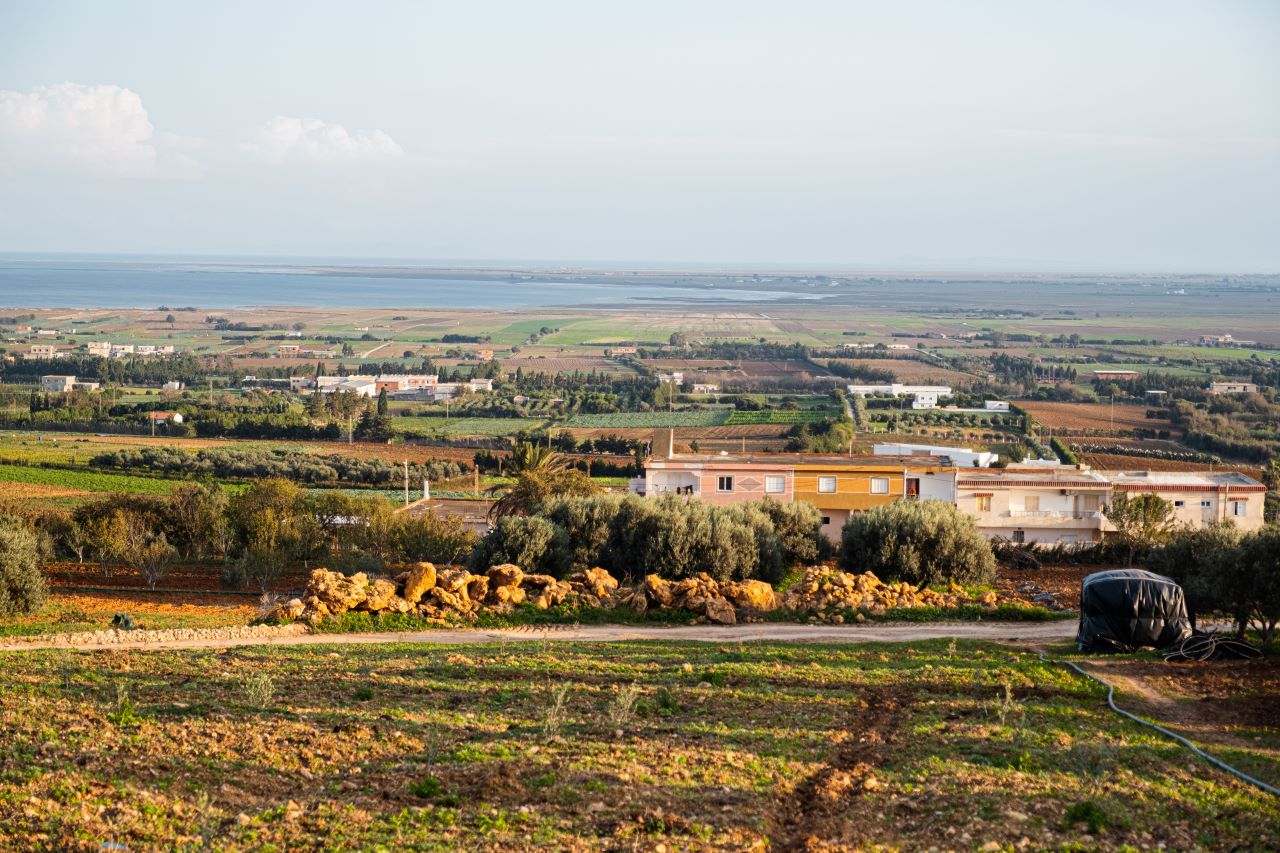
The project ACCISI-GEM is implemented in selected plots in the Ghar El Melh region, Bizerte, Tunisia.
ACCISI-GEM has two main pillars of implementation: a technical and a policy one. Through the implementation of smart irrigation practices, it aims to benefit local society’s well-being and the economy and protect the area’s ecological and cultural treasures. The system applied in selected plots, incorporates renewable energy sources, specifically photovoltaics, to power the pumps used for extracting water from wells. This approach aims to significantly reduce reliance on conventional energy, lowering operational costs and minimizing the environmental footprint of water management practices.
To support sustainable agricultural practices and enhance ecosystem health, two piezometers have been installed to monitor both deep and groundwater levels. These installations provide valuable data for managing water resources more effectively.
The Workshop continued with a session dedicated to the Technical Component of ACCISI-GEM and involved targeted presentations as well as interventions by farmers.
Dr. Nikos Skondras, Senior Programme Officer GWP-Med presented the Nexus approach and the advantages of integrated management of resources in tackling current challenges such as climate change impacts. He emphasized the importance of investments in the broader application of the NEXUS and provided valuable examples of technical solutions throughout the Med such as the Smart Irrigation System that will be applied in the selected farms in Ghar El Melh.
Prof. Ali Sahli, National Agronomic Institute of Tunisia, the Scientific and Technical Partner of the ACCISI-GEM Project, explained how the ICT (Information and Communication Technologies)-based irrigation system that monitors soil and crop conditions and water requirements in real time will allow farmers to receive precise, data driven decisions about when and how much water to apply to their crops.
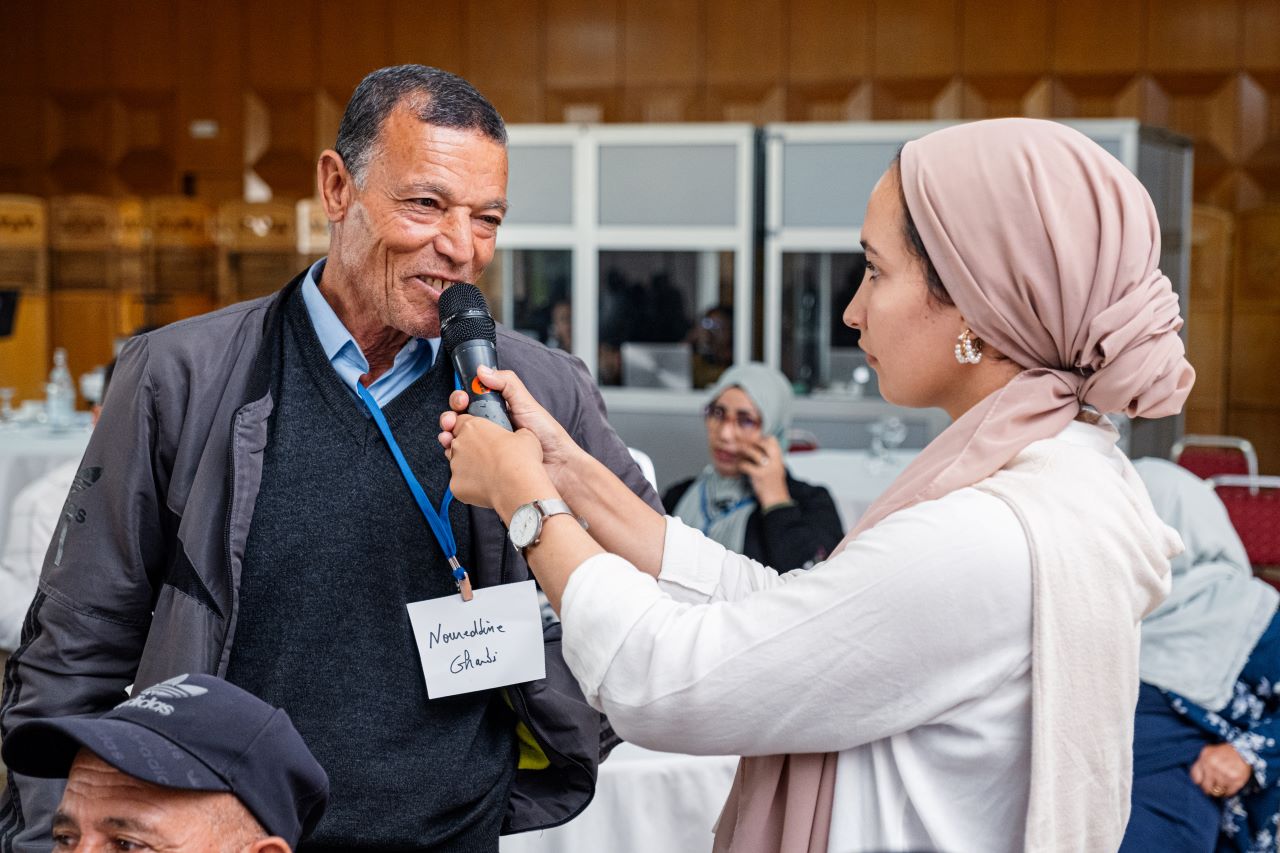
Mr. Noureddine Gharbi who was a farmer from GEMWET stated:
"It is like second life for my plot. I used to release water for 7 hours and now I reduced water and I took into consideration the idea because it was very good. Now I am paying less bills and making more money. We need to regulate drops by drops. I spoke with engineers etc. I am illiterate I couldn’t afford to go to schools but I wanted to learn more about the sector from experienced persons like Fatma and Mr. Ali who came to me and gave me this idea. I was fearing this technique but in the end of the day it is something easy to help you manage in your own way your water resources and your cultivations. I accepted it and I saw it as a very efficient tool. I will help my colleagues."
The next session, moderated by Mr. Kais Ayed, GWP-Med Policy Dialogue Expert, concerned the Policy Dialogue Component of ACCISI-GEM, and focused on scaling up and replicating smart agriculture interventions through institutional integration and financial incentives. Mr. Ayed presented the results of a literature review, initiating a policy dialogue on creating an enabling environment and developing action plans to support the national and regional dissemination of these solutions. Panelists, including representatives from the Ministry of Agriculture, the Agricultural Investment Promotion Agency (APIA), ENDA Tamweel, and private startups, explored available incentives such as subsidies for solar-powered irrigation and energy-efficient water systems provided by the Energy Transition Fund and the Tunisian Investment Fund. They also addressed challenges like inadequate financing, limited institutional coordination, and the need for enhanced farmer training and awareness of the Water-Energy-Food-Ecosystems (WEFE) Nexus principles.
The session emphasized the importance of strengthening institutional frameworks, expanding technical resources, and fostering collaboration to drive the transition to sustainable farming practices in Tunisia. These measures aim to enhance resource efficiency and empower farmers to adopt innovative, climate-smart solutions effectively.
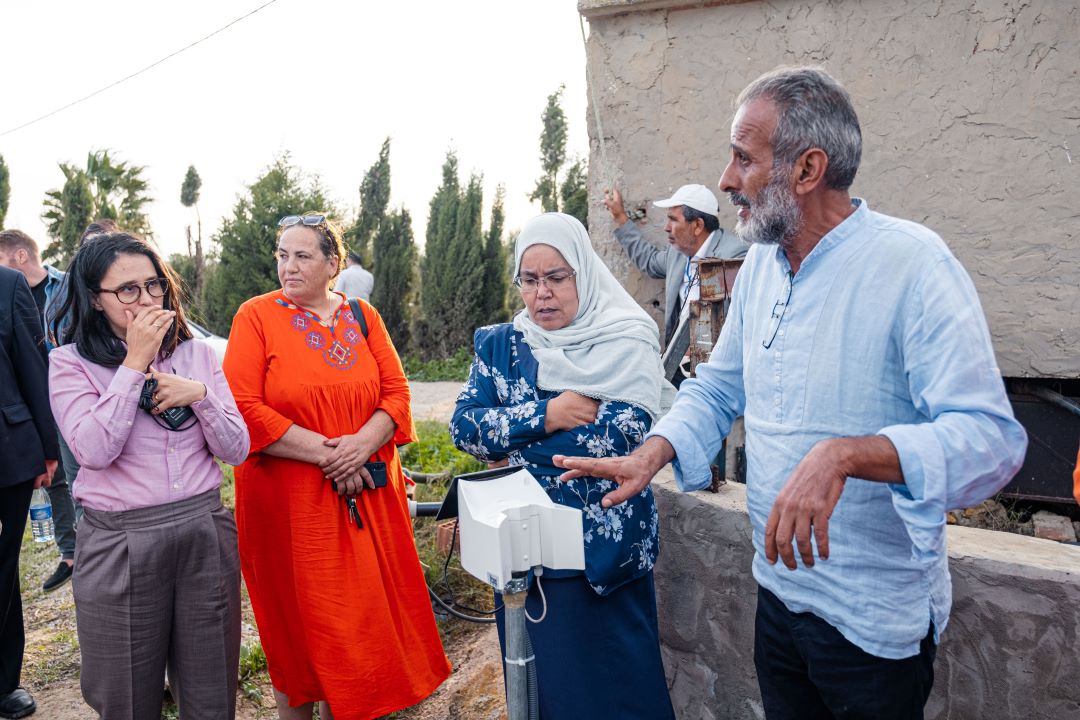
At the national level, the inclusive multi-stakeholder policy dialogue will assist with developing an action plan for upscaling such interventions, while also identifying catalytic and financing options for farmers to use these technologies with the aim to create a self-sustaining mechanism that can facilitate the uptake of the approach throughout the country.
By upscaling and replicating the project’s efforts in other parts of Tunisia and beyond, the project will contribute to the country’s efforts towards the achievement of Sustainable Development Goals, including SDG 6 on Clean Water and Sanitation, SDG 12 on Responsible Consumption and Production, SDG 13 on Climate Action, SDG 14 on Conserving and Sustainably use the oceans, seas and marine resources for sustainable development, as well as with SDG 15 on protecting, restoring and promoting the sustainable use of terrestrial ecosystems and halting biodiversity loss.
Adapting to Climate Change Impacts through Smart Irrigation in Ghar El Melh wetland area, Tunisia (ΑCCISI GEM) Project was launched in late 2023, implemented in the Governorate of Bizerte, by the Global Water Partnership - Mediterranean under the leadership of the General Directorate of Rural Engineering and Water Exploitation (DG-GREE) within the Tunisian Ministry of Agriculture, Hydraulic Resources and Fisheries, in partnership with the National Institute of Agronomy of Tunisia and in collaboration with the Regional Commissary for Agricultural Development CRDA Bizerte. It is financially supported by the Ministry for Foreign and European Affairs and Trade of Malta and the GEF UNEP/MAP MedProgramme .
